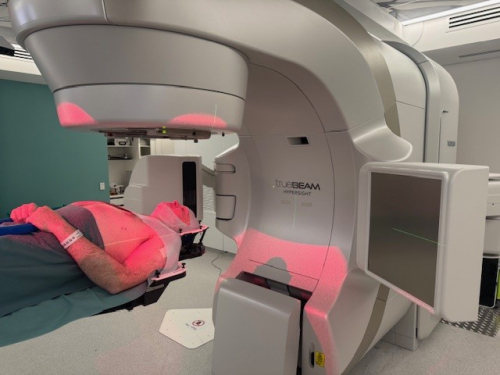New hope for cancer patients

Doctors at The Alfred were the only Australian researchers involved in an international randomised trial published in The Lancet that has shown patients live significantly longer when stereotactic ablative radiotherapy (SABR) is used to target all of their tumours.
One of the trial participants is former Caulfield Hospital engineer Peter Laycock, who received the difficult news that his prostate cancer had returned and spread.
“Previously, a patient like Peter would be told that he has metastatic disease that’s most likely incurable, but here we are three years later and he’s living life as if nothing has happened,” said lead investigator for the study, A/Prof Sasha Senthi.
Peter is now enjoying life in retirement with his two grandchildren (and another on the way).
“We are always looking for ways to apply this technology, and when we talked to Peter we said we don’t know if this is going to work, and it’s great through this trial we can show it does work for people with a limited number of tumours,” said A/Prof Senthi.
A/Prof Senthi, Stereotactic Radiation Oncologist at The Alfred, said until recently, the best option for patients would often be gruelling courses of chemotherapy in an attempt to slow their cancer down.
SABR uses laser-guided imaging and robotic positioning to deliver ultra-high radiation doses to tumours without damaging the healthy tissue that surrounds it.
The trial was conducted across four countries and showed that SABR resulted in almost half the patients surviving five years or more – at least one year longer than with the current standard of care therapies.
“We have been using surgery to remove single tumours for decades but patients with multiple tumours would typically not be operated on,” A/Prof Senthi said.
“With SABR, we have found a potentially curative treatment for patients with up to five tumours.
“The trial clearly showed SABR gave people more time and did so without impacting their quality of life, such that they could enjoy this time with family and friends.”
The trial included patients with all cancer types so long as they had five or less tumours that could have spread anywhere in the body including the brain and liver.
Results of the trial were published in The Lancet on 11 April, 2019.


